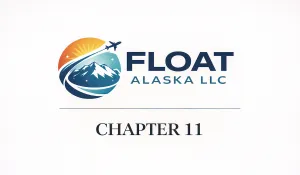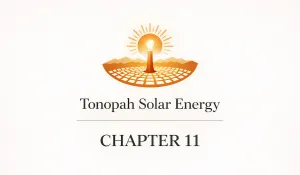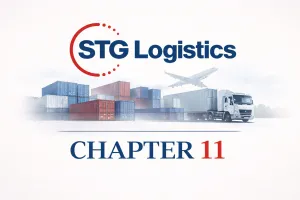Case Summary: TimberHP Chapter 11
TimberHP has filed for Chapter 11 bankruptcy following construction delays and cost overruns on its wood fiber insulation plant, securing stakeholder support for a pre-arranged reorganization.
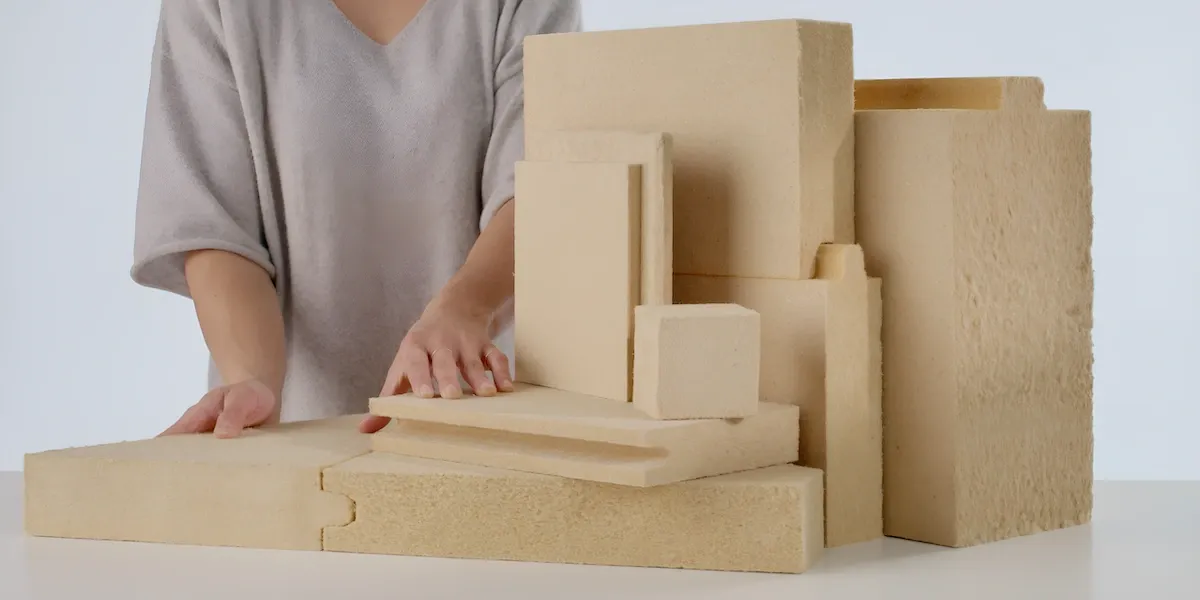
Business Description
Headquartered in Madison, ME, GO Lab, Inc. (dba TimberHP), along with its Debtor⁽¹⁾ and non-Debtor affiliates (collectively, "TimberHP" or the "Company"), operates as a start-up manufacturer of high-performance wood fiber construction insulation.
- TimberHP is positioned as the only manufacturer of wood fiber insulation in North America, utilizing clean softwood residuals (wood waste from sawmills and chips from low-value trees) sourced locally.
- The Company refines these residuals into fiber, which is then processed into three distinct commercial insulation products designed as sustainable, price-competitive alternatives to traditional fiberglass, mineral wool, and foam insulation:
- TimberBatt: Semi-rigid batts for cavity insulation in walls, ceilings, rafters, and attics.
- TimberFill: Loose-fill and dense-pack insulation for attics and stud cavities.
- TimberBoard: Rigid boards for continuous interior and exterior above-grade insulation (production line currently incomplete).
- TimberHP markets its products as carbon-negative, non-toxic, safe, and biodegradable, claiming they sequester more carbon than emitted during production and offer superior moisture management compared to conventional insulation.
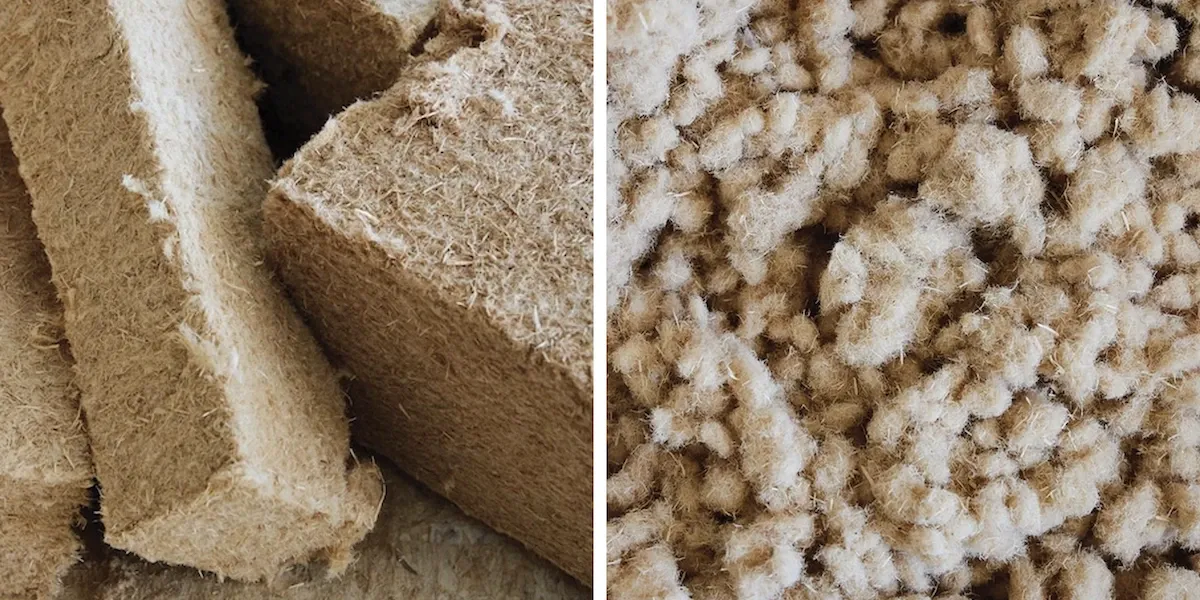
The Company targets the U.S. residential and commercial construction markets, which it estimates will reach $4.1 billion and $4.0 billion respectively by 2025. TimberHP aims to capture a niche within this market, focusing on wood-frame construction (over 95% of the U.S. residential market) and leveraging growing demand for sustainable building materials and regulatory incentives (e.g., Zero Energy Ready Homes Tax Credit, MASS Save, USDA BioPreferred Program).
- With a fully operational facility, TimberHP projects a maximum production capacity capable of generating approximately $170 million in annual revenue, representing about 2% of the relevant U.S. insulation market segments.
- In mid-2024, TimberHP formed a strategic distribution alliance with CertainTeed, Inc. (a subsidiary of Saint-Gobain), granting CertainTeed rights to distribute TimberBatt and TimberFill across the U.S. and exclusively in Canada, significantly expanding market reach.
As of the Petition Date, the Debtors employed 54 full-time employees at their Madison Facility.
TimberHP filed for Chapter 11 protection on Mar. 25 in the U.S. Bankruptcy Court for the District of Delaware. As of the Petition Date, the Debtors reported $500 thousand to $1 million in assets and $10 million to $50 million in liabilities.
⁽¹⁾ Go Lab Madison, LLC. (together with GO Lab, Inc., the "Debtors").
Corporate History
GO Lab, Inc. ("GO-Inc.") was founded in 2017 in Maine by architect Matthew O’Malia and former chemistry professor Dr. Joshua Henry. Their mission was to produce sustainable building insulation, reduce the embodied carbon of buildings, and revitalize Maine's rural economy by introducing wood fiber insulation, a product well-established in Europe but absent from North American manufacturing.
- Early catalysts included identifying a market gap and securing a deal in 2017 for used production equipment from German manufacturer Homanit at a significant discount.
Acquisition and Initial Funding
- In 2019, GO-Inc. acquired the shuttered 600,000 sq. ft. Madison Paper Industries mill in Madison, ME, for $1.4 million, intending to repurpose the site.
- The acquisition and initial retrofit costs were supported by approximately $12.5 million in seed capital (convertible instruments) obtained in 2019, along with various unsecured loans and a $2.4 million public-private financing package assembled in September 2019 involving state and local entities like FAME, MTI, MRDA, and the Town of Madison, among others. This funding enabled the mill purchase, engineering work, and transport of equipment from Germany.
Financing Restructuring and Scale-Up
- An initial ~$65 million phased financing plan, including New Markets Tax Credits ("NMTC"), collapsed in early 2020 due to the COVID-19 pandemic.
- The Company pivoted to a larger, single-phase financing strategy to build out all three production lines simultaneously.
- In 2021, the Finance Authority of Maine ("FAME") approved the issuance of $85 million in tax-exempt "green bonds".
- That same year, the Company completed a Series A equity offering of approximately $27.5 million. The prior Seed Investment converted upon this funding, resulting in a total Series A investment of approximately $40 million.
- Also in 2021, the Company closed on a $24 million NMTC transaction.
Construction, Launch, and Financial Headwinds
- Construction and retrofitting of the Madison mill began in 2021, led by contractor Cianbro Corp., with a groundbreaking ceremony in January 2022.
- TimberHP began manufacturing its first product, TimberFill, in 2023, marking the first commercial production of wood fiber insulation in North America.
- Production and sale of the second line, TimberBatt, commenced in February 2024.
- Despite product launches, the project faced significant financial difficulties due to construction cost overruns exceeding $30 million, leaving the third production line (TimberBoard) incomplete.
Corporate Structure

GO-Inc. is the parent entity. Its equity is held by approx. 140 investors via common stock (~18.5%), preferred stock (~78.2%), and warrants (~3.3%), with the largest holder owning ~12.6% (fully diluted).
- GO-Inc. is the sole member of non-Debtors GO Lab Madison Holdings, LLC ("GO-Holdings") and GO Lab Madison Finance, LLC ("GO-Finance"), and majority owner of non-Debtor GO Lab Lending, LLC ("GO-Lending").
- GO-Holdings is the sole member of Debtor GO Lab Madison, LLC ("GO-Madison").
- GO-Madison is the primary operating entity, owning substantially all assets, including the Madison Facility and equipment.
- GO-Lending and GO-Finance were formed for tax-exempt financing requirements; their sole assets relate to the Leverage Loan and a Debt Service Reserve Fund for the Green Bonds, respectively. GO-Holdings' sole asset is the membership interest in GO-Madison.
Operations Overview
TimberHP's operations are centralized at its manufacturing plant and headquarters located at the former Madison Paper Industries site in Madison, ME (the “Madison Facility”). The facility comprises approximately 600,000 sq. ft. of retrofitted space housing production lines, warehousing, and support infrastructure.
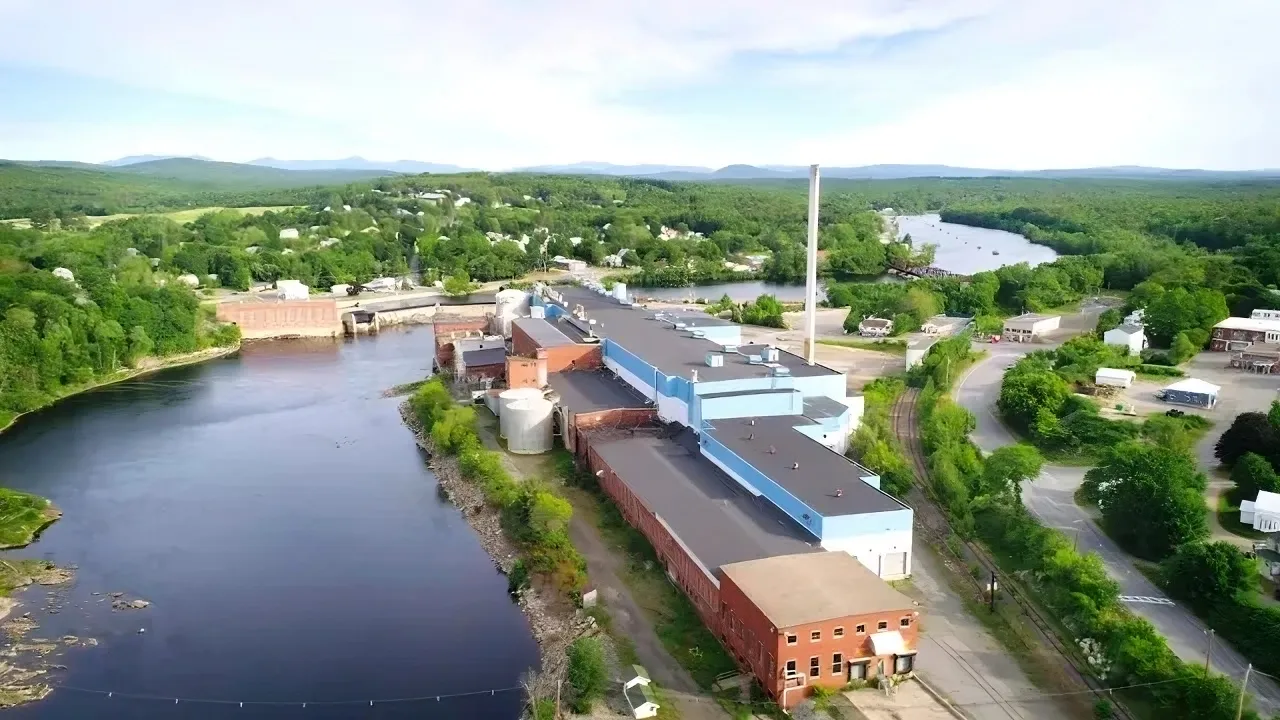
Production Lines and Capacity
- As of the Petition Date, two of the three planned production lines are operational:
- TimberFill (loose-fill insulation): Began production in 2023.
- TimberBatt (batt insulation): Began production in early 2024.
- The third line, for TimberBoard (rigid board insulation), remains incomplete due to funding shortfalls. Completing this line is a key objective of the Chapter 11 reorganization, as TimberBoard is projected to be the highest-margin and largest revenue contributor.
- The fully operational plant is designed for a production capacity yielding approximately $170 million in annual revenue.
Manufacturing Process and Supply Chain
- The primary raw material is softwood residual chips (spruce, pine, fir) sourced from forestry and sawmill operations in Maine and the Northern Forest region, positioning the process as upcycling wood waste.
- The manufacturing process involves refining wood chips into fiber, followed by forming, binding (with non-toxic adhesives), drying, and cutting. Production lines utilize key machinery acquired second-hand from European suppliers (e.g., Homanit).
- Integrating new and used equipment into the retrofitted 1980s-era mill presented significant engineering challenges, contributing to delays and cost overruns.
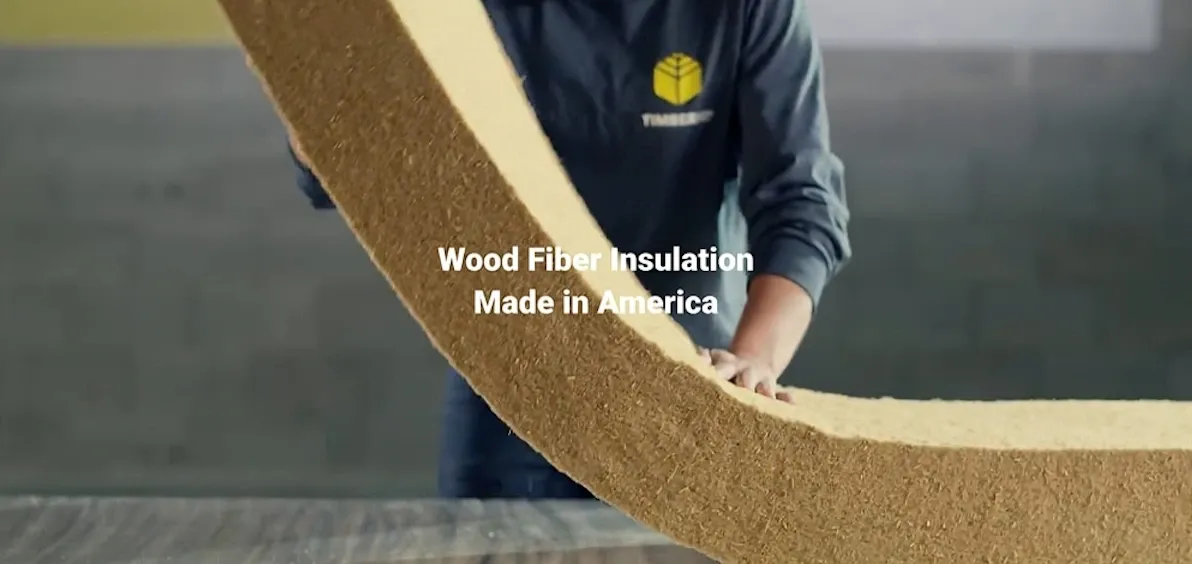
Workforce
- As of the Petition Date, TimberHP employed 54 full-time staff and anticipates adding approximately 66 positions upon reaching full operational capacity.
Sales and Distribution
- Commercial sales of TimberFill and TimberBatt began in 2023 and early 2024, respectively, initially targeting the Northeast U.S.
- The partnership with CertainTeed (announced June 2024) provides national U.S. distribution and exclusive Canadian distribution, leveraging Saint-Gobain's established network.
- Marketing emphasizes sustainability, carbon negativity, and performance characteristics, targeting builders, architects, and the high-performance building community (e.g., Passive House).
Other Assets
- GO-Inc. holds membership interests in subsidiaries, bank accounts, vehicles, limited equipment, and intellectual property.
- GO-Madison holds the Madison Facility (real estate, improvements, fixtures), substantially all equipment, bank accounts, inventory, and accounts receivable.
- In 2024, GO-Inc. was approved for a federal Advanced Energy Project Credit (Section 48C) of approximately $16.8 million related to the Board Line equipment, claimable once the line is placed in service.
Prepetition Obligations

Top Unsecured Claims
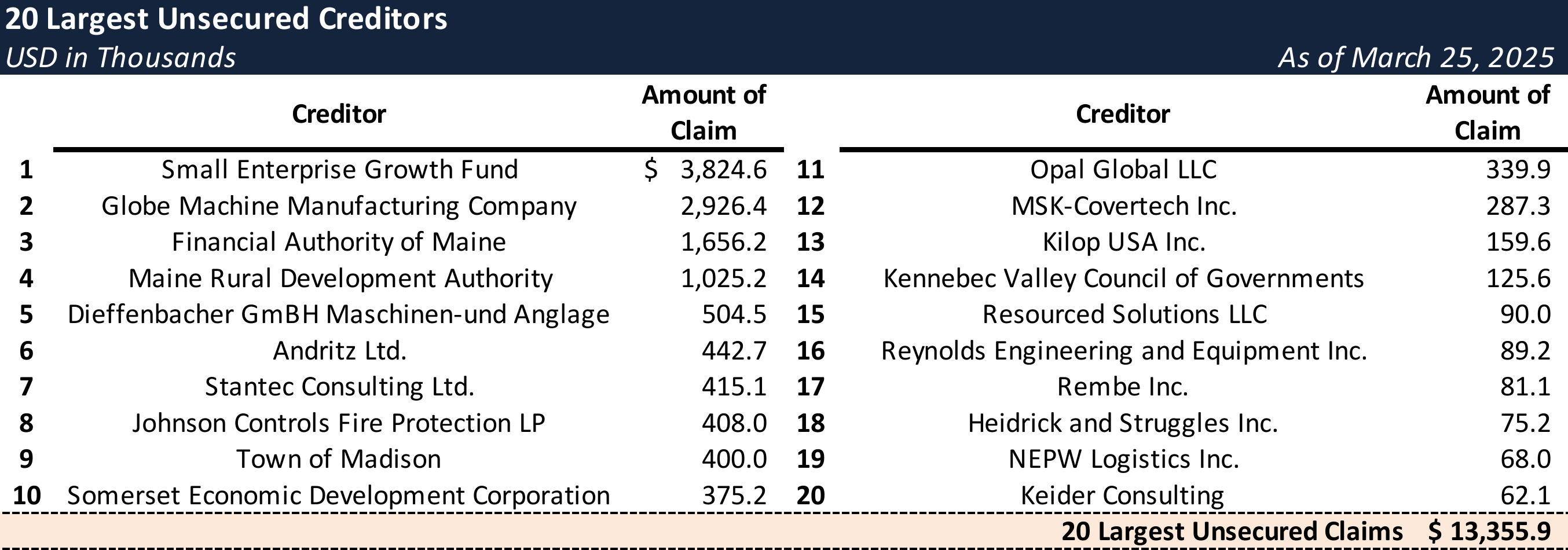
Events Leading to Bankruptcy
TimberHP's path to Chapter 11 was driven by significant financial setbacks stemming from the complex retrofit of the Madison Facility, despite successfully launching two product lines and securing market interest.
Project Cost Overruns and Completion Delays
- The conversion of the former paper mill incurred substantial, unbudgeted cost increases exceeding $30 million. Key drivers included:
- Inflation: Pandemic-era price surges for critical materials like structural steel and electrical components significantly exceeded initial budgets.
- Supply Chain Disruptions: Lingering pandemic effects caused delays and increased costs for sourcing specialized machinery and parts, particularly from Europe.
- Engineering Challenges: Retrofitting the aged facility presented unforeseen complexities, leading to substantial change orders and increased engineering expenses.
- These overruns and delays prevented the completion of the third and potentially most profitable production line, the TimberBoard line, hindering the Company's ability to reach planned capacity and revenue targets.
Liquidity Constraints and Funding Shortfalls
- To cover the budget gap and fund ongoing operations, TimberHP attempted to raise approximately $60 million through a Series B equity offering in 2023-2024.
- However, they were only successful in securing approximately $31 million, leaving a critical funding shortfall and severely straining operating capital.
- The lack of sufficient capital forced the Company to drastically reduce operating expenses, delaying the TimberBatt launch and hindering the sales ramp-up for TimberFill.
- The substantial debt burden, including $85 million in Green Bonds and other loans, became unsustainable without the projected revenue from all three lines.
Mounting Creditor Pressure
- As liquidity tightened, the Company fell behind on payments to key construction contractors.
- Two major contractors, Cianbro Corporation and Gilman Electrical Supply, recorded mechanic's liens against the Madison Facility totaling over $15 million for unpaid work.
Failed Strategic Alternatives and Path to Chapter 11
- Facing escalating financial pressure, the Company entered into a Standstill and Forbearance Agreement with the Bond Trustee on September 6, 2024, which included milestones for a capital raise or sale.
- Investment bank Jefferies LLC was retained in September 2024 to market the assets and seek capital, soliciting over 190 parties.
- An indication of interest (IOI) was received from a potential purchaser in September 2024, providing temporary hope and leading to a small forgivable loan (2024 SEDC Loan) in December 2024 to bridge liquidity.
- However, the potential acquisition transaction collapsed in early February 2025 when the purchaser withdrew, eliminating a crucial lifeline.
Pre-Negotiated Restructuring
- Following the failed sale, the Debtors engaged in extensive negotiations with key stakeholders, including bondholders, lenders (QLICI, Series B, SEDC), mechanic's lien claimants (Cianbro, Gilman), trade creditors, and secured lienholders (Saint Gobain, D.R. Horton).
- These negotiations resulted in broad support, formalized through numerous Restructuring Support Agreements (RSAs), for a pre-negotiated Chapter 11 plan.
- On March 25, 2025, the Debtors filed voluntary Chapter 11 petitions in the District of Delaware (Case No. 25-10557).
- The proposed Plan includes:
- A $10 million DIP Facility provided by certain prepetition bondholders via UMB Bank as agent, converting to a term loan upon exit.
- An Exit Facility projected at not less than $19 million in new debt financing from Participating Bondholders.
- Treatment for trade creditors and discounted payments for mechanic's lien claimants.
- Cancellation of existing equity, with new equity issued primarily to Participating Bondholders (94.5%) and Series B Holders (5.5%), subject to dilution.
DIP Budget

Stay informed on every Chapter 11 bankruptcy case with liabilities exceeding $10 million. Subscribe for free to have our coverage delivered directly to your inbox, and explore our full archive of past summaries.
If you're already a subscriber and would like to receive timely filing alerts, please reach out and we'll add you to the distribution list.
